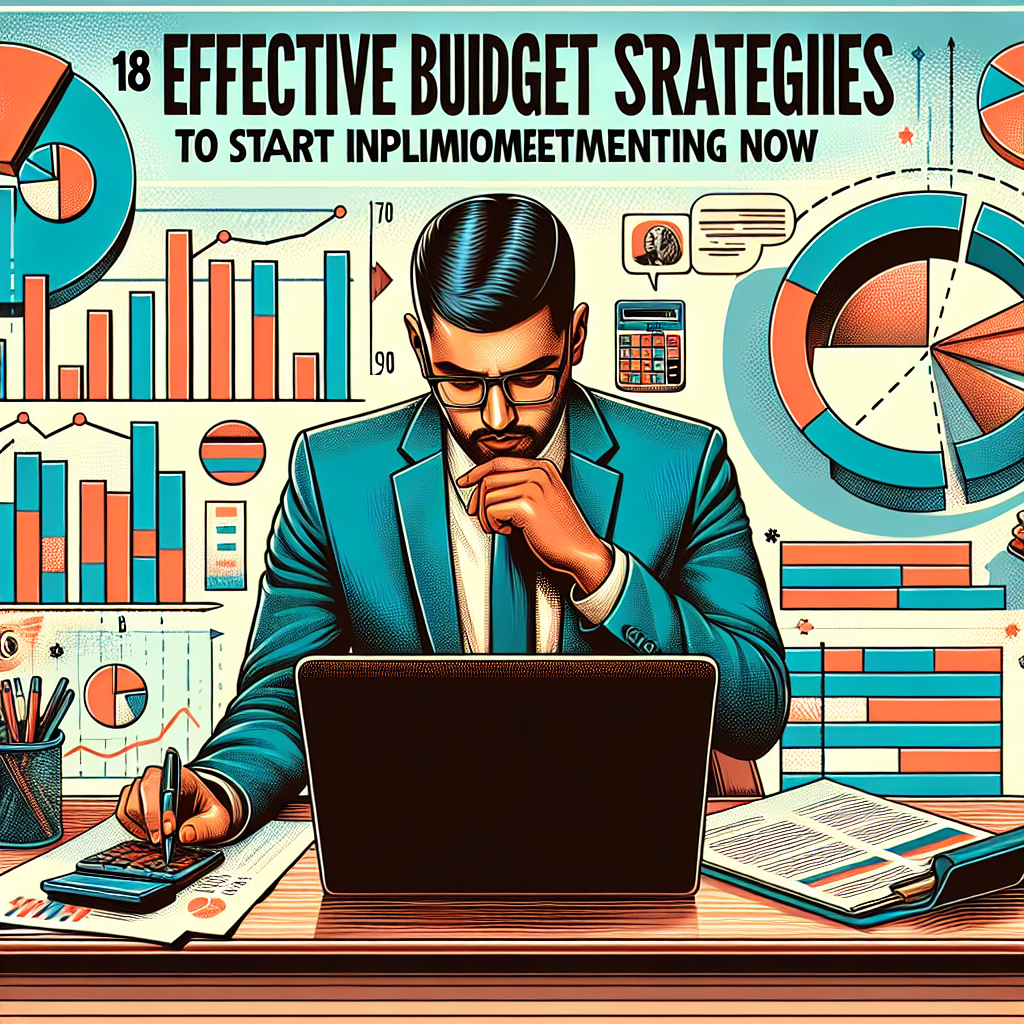Last updated Jun. 19, 2024 by Peter Jakes
18 Effective Budgeting Strategies To Start Implementing Right Now
The journey towards financial health and stability requires a blend of diligently tracking expenses, saving, and making informed financial decisions. Having a strategy and sticking to it can transform your financial well-being. Here are 18 effective budgeting strategies you can start implementing right now to set yourself on the path of financial discipline and success.
1. Establish Clear Financial Goals
Setting clear and specific financial goals is the cornerstone of effective budgeting. Whether it’s paying off debt, saving for a down payment on a house, or building an emergency fund, clearly defined goals will provide direction and motivation. Divide your goals into short-term (up to 1 year), mid-term (1 to 5 years), and long-term (over 5 years) to better organize your financial planning.
2. Track Your Spending
Keeping a detailed record of your spending habits is essential. Use tools like expense-tracking apps, spreadsheets, or even a simple notebook. By tracking your expenses, you can identify spending patterns and areas where you can cut back. This awareness is crucial for creating a realistic budget.
3. Create a Monthly Budget
A monthly budget is the backbone of financial management. Allocate portions of your income to different categories such as housing, groceries, transportation, savings, and entertainment. Make sure to allocate some money to discretionary spending to avoid feeling deprived, which can lead to impulse spending.
4. Use the 50/30/20 Rule
The 50/30/20 rule is a straightforward budgeting method that allocates 50% of your income to necessities, 30% to discretionary expenses, and 20% to savings and debt repayment. This rule can help you organize your spending and ensure that you’re saving enough each month.
5. Automate Savings
Automating your savings can ensure that you consistently set aside money without having to think about it. Set up an automatic transfer from your checking account to a savings account. Treat your savings like a non-negotiable expense, just like rent or utilities.
6. Reduce Discretionary Spending
Take a hard look at your discretionary spending and identify areas where you can cut back. This might mean reducing the frequency of eating out, limiting online shopping sprees, or canceling unnecessary subscriptions. Redirect the money you save into your savings or investment accounts.
7. Build an Emergency Fund
An emergency fund is crucial for financial stability. Aim to save at least 3 to 6 months of living expenses in a separate, easily accessible account. This fund will provide a cushion in case of unexpected expenses like medical emergencies, car repairs, or job loss.
8. Pay Off High-Interest Debt
Debt, especially high-interest debt like credit card balances, can cripple your financial health. Focus on paying off these debts as quickly as possible. Consider using the avalanche method (paying off debts with the highest interest rates first) or the snowball method (paying off the smallest debts first) depending on what motivates you more.
9. Use Cash and Avoid Credit Cards
Using cash for your daily expenses can help curb overspending. The physical act of handing over cash makes you more mindful of your expenditures. Alternatively, if you prefer using cards, make sure it’s a debit card linked to an account where you only keep money allocated for discretionary spending.
10. Set Up a Sinking Fund
A sinking fund is a way to save for large, predictable expenses by setting aside a small amount each month. For example, if you know you’ll need $1,200 for a vacation next year, start saving $100 a month. This approach prevents you from having to dip into your savings or incur debt.
11. Reevaluate and Adjust Your Budget Regularly
Your financial situation and goals can change, so it’s important to revisit and adjust your budget regularly. Set a reminder to review your budget monthly or quarterly, ensuring it still suits your current circumstances and future goals.
12. Utilize Budgeting Apps
Leverage technology to simplify budgeting. Apps like Mint, YNAB (You Need A Budget), and Personal Capital help you track expenses, set goals, and view all your financial transactions in one place. These tools provide insights and help you stay accountable.
13. Practice Mindful Spending
Before making a purchase, especially larger ones, take a step back and evaluate if it’s a need or a want. Avoid impulse buying by giving yourself a cooling-off period, such as 24 hours, before making a purchase decision.
14. Embrace Frugal Living
Frugality doesn’t mean deprivation; it’s about making more mindful spending choices. Look for discounts, use coupons, buy second-hand items, and reduce waste. Frugal living can lead to significant savings which can then be redirected towards your financial goals.
15. Invest in Your Financial Education
Understanding personal finance basics, such as investing, taxes, and insurance, can give you greater control over your financial future. Read books, attend workshops, or take online courses to expand your financial knowledge and make better-informed decisions.
16. Negotiate Bills and Subscriptions
Many people don’t realize they can negotiate certain bills and subscriptions to lower their costs. Contact your service providers for phone, internet, insurance, and other regular bills to see if there are ways to reduce the rates or find better deals.
17. Plan for Irregular Expenses
Irregular expenses like car maintenance, home repairs, or annual subscriptions can throw off your budget if not planned for. Keep a separate fund for these irregular expenses and contribute to it regularly so you’re not caught off guard when they arise.
18. Reward Yourself
Lastly, remember to reward yourself for sticking to your budget. It can be small, like a night out or a treat, as long as it doesn’t derail your financial goals. Rewards help reinforce positive financial behavior and keep you motivated.
FAQs
1. What is the best budgeting method for beginners?
For beginners, the 50/30/20 rule is often recommended due to its simplicity. Allocate 50% of your income to necessities, 30% to discretionary expenses, and 20% to savings and debt repayment.
2. How often should I reevaluate my budget?
It’s advisable to review your budget at least monthly or quarterly. This helps ensure that it remains aligned with your financial goals and any changes in your income or expenses.
3. What should I do if my expenses exceed my income?
If your expenses exceed your income, start by identifying discretionary spending areas that you can cut down on. Additionally, look for ways to increase your income, such as gig work or a part-time job.
4. How much should I have in an emergency fund?
Aim to save at least 3 to 6 months’ worth of living expenses in an emergency fund. This amount should provide a cushion to manage unexpected financial setbacks.
5. Can I use credit cards while budgeting?
Yes, you can use credit cards while budgeting, but it requires discipline. Make sure to pay off your balance in full each month to avoid interest charges, and avoid using credit cards for discretionary purchases unless you can pay them off immediately.
6. Is it better to pay off debt or save money?
This depends on your situation. If you have high-interest debt, it’s generally advisable to pay it off first. However, continue to build a small emergency fund for unexpected expenses simultaneously. Once high-interest debts are cleared, you can focus more on saving and investing.
7. How can I stay motivated to stick to my budget?
Set clear financial goals, track your progress regularly, and reward yourself for milestones achieved. Having an accountability partner or joining financial support groups can also provide motivation and encouragement.
8. What are some effective tools for budgeting?
Popular budgeting tools include apps like Mint, YNAB (You Need A Budget), and Personal Capital. Spreadsheets and expense-tracking software like Microsoft Excel or Google Sheets are also effective.
9. How can I reduce my monthly bills?
To reduce monthly bills, look for areas to cut back like eating out, entertainment, or subscriptions. Negotiate with service providers for better rates on things like phone plans, internet, and insurance.
10. What if I have irregular income?
If you have irregular income, focus on averaging your income over several months to create a working budget. Prioritize saving more during higher income months to buffer expenses during leaner periods.
11. Are there budgeting methods for seasonal workers?
Yes, seasonal workers should budget by saving a portion of earnings during peak seasons to cover expenses during off-seasons. Setting up a separate savings account for off-season expenses can help manage irregular income effectively.
12. What’s the difference between a budget and a financial plan?
A budget is a short-term financial tool focusing on income and expenses over a set period, typically monthly. A financial plan is more comprehensive, outlining long-term financial goals and strategies to achieve them, including investments and retirement planning.
13. How can I budget for fun activities?
Allocate a portion of your discretionary spending for entertainment and activities you enjoy. This can prevent feelings of deprivation and help you stick to your budget longer.
14. What’s the best way to handle shared expenses with a partner?
Handling shared expenses transparently by combining incomes and expenses, or splitting bills proportionately to each partner’s income, can work well. Having joint discussions about financial goals and budgeting as a team is crucial.
15. How do I know if my budget is realistic?
A realistic budget accurately reflects your actual income and expenses. Track all spending for a few months to set honest and achievable limitations, and adjust as necessary.
16. Is it okay to adjust my budget frequently?
Yes, budgets should be flexible and adaptable to changes in your financial situation, such as income fluctuations or unexpected expenses. Regular adjustments help keep your budget relevant and functional.
17. Can I combine multiple budgeting strategies?
Absolutely! You can blend different budgeting strategies to suit your financial goals and lifestyle. For instance, you might use the 50/30/20 rule alongside sinking funds and automated savings to maximize your financial management.
18. Why is it important to have a sinking fund?
A sinking fund allows you to save consistently for predictable, large expenses like car repairs or vacations, preventing these from impacting your regular budget or requiring debt.
Incorporating these budgeting strategies can significantly impact your financial health, providing you with greater control and peace of mind. Remember, the key is to start now – the sooner you implement these strategies, the sooner you’ll see the benefits. Happy budgeting!







